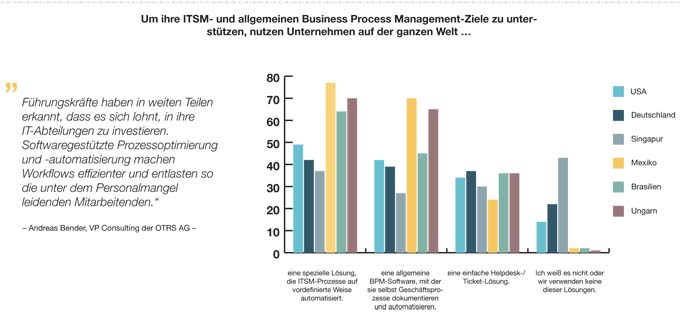Automation of business processes: Often the know-how is missing
According to a recent survey, one in two companies in Germany has already invested in tools to automate business processes, but almost half of them are not yet using them. Lack of expertise and adherence to manual processes stand in the way of successful automation.

While AI solutions like ChatGPT have dominated the headlines for months, many companies are still struggling to build up the necessary expertise to leverage the potential of (hyper)automation for themselves. A study by OTRS AG, the manufacturer and service provider for the Enterprise Service Management Suite of the same name, also came to this conclusion. In an online survey for the study "OTRS Spotlight: IT Service Management 2023", 600 business owners and senior executives in Germany, the USA, Brazil, Mexico, Singapore and Hungary took part.
Germany: The tools are there, but the expertise is lacking
In principle, our northern neighbor is well positioned when it comes to process automation: More than half of German companies (55 percent) have invested in tools to automate their business processes. However, 42 percent of them lack the necessary expertise to use them, according to the study. Only 24 percent of those who have already invested in business process automation (BPA) are also already actively using artificial intelligence (AI) or machine learning as part of their daily tasks and workflows. A further 29 percent of the BPA pioneers have already invested in tools for this purpose, but have not yet actively used them due to a lack of expertise, according to another result of the survey. One in five German companies that have not yet invested in BPA tools cites a lack of the necessary skills in the team to address the issue as the reason.
IT teams are the driving force behind business process automation
The expertise needed to drive forward the automation of business processes lies primarily in the IT departments or is being expanded there: In a good third of companies in Germany, it is they who are currently actively involved in this (35 percent). They are followed at some distance by logistics (22 percent) and administration (21 percent). In the international ranking, facility and office management rank second and third behind IT. In one in five companies in Germany, no department is currently actively looking at automating business processes. However, one fifth of all German companies also intend to invest in BPA in the next twelve months. Slightly more than a third of those that have already done so also want to start integrating AI and machine learning into their business processes in the next two to five years (36 percent).
Automation works: reduced costs, increased adaptability
Executives in Germany who have already automated business processes primarily expected cost savings (22 percent) and the ability to adapt more quickly to changes (20 percent). Increased employee satisfaction was cited by 15 percent as their top expected benefit, and 13 percent each expected primarily time savings and increased customer satisfaction from their investments in BPA. Reducing data errors (9 percent), accelerating business growth (5 percent) and improved security handling (4 percent) were the biggest anticipated benefits for only a few.

To a large extent, the effects were realized to the expected extent. German executives most frequently observed increased adaptability (22 percent) and cost savings (20 percent) as the greatest benefits since their BPA measures. Fifteen percent each noted time savings, reduced data errors and increased employee satisfaction as the greatest realized benefits. Seven percent noted increased customer satisfaction as the greatest actual benefit, and the same number noted faster business growth.
Dearly-held manual processes block the path to automation
A lack of know-how in the company is by no means always the reason for not yet having invested in business process automation tools despite these advantages. More than a quarter (27 percent) of those who have not yet invested in them in Germany believe that manual processes are sufficient for them. 22 percent cite not having found a suitable tool as the main reason for their reluctance to invest in BPA tools. 16 percent cite not having had the time to deal with it yet, as it seems to be a big project.
Andreas Bender, VP Consulting at OTRS AG, warns: "Companies that completely stick to their manual processes will lose competitiveness in the medium term. Pioneers are already saving costs through automation, are more agile and work more efficiently. As AI solutions and machine learning advance, they will continue to extend this lead. Managers should therefore put their manual processes to the test and optimize and automate them wherever possible in order not to lose out. As with any project that changes work processes, they should make sure that their employees are actively involved in the change process and that they take part in it. Automation only succeeds when people and machines work together."
Source: www.otrs.com









